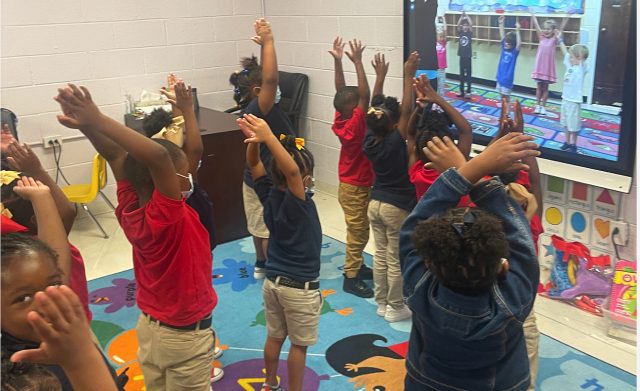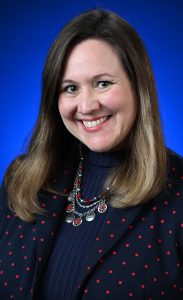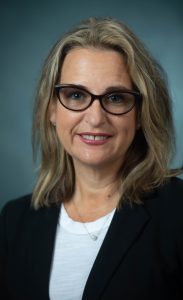
Students in Najah Jones’ pre-K classroom at Rosser Early Learning Center in Moorehead practice yoga each week as a part of the School of Education’s Growing Healthy Minds, Bodies and Communities program. The program teaches teachers how to include mindfulness, yoga, gardening and other holistic practices in the classroom. Photo courtesy Najah Jones
OXFORD, Miss. – In a pre-K classroom at Rosser Early Learning Center in Moorehead, children sit with legs crossed and eyes closed. In what is normally a bustling classroom, an unexpected silence settles in.
This silence is not nap time; it is the practice of mindfulness.
Each summer, teachers from across the state flock to the University of Mississippi School of Education‘s annual Growing Healthy Minds, Bodies and Communities retreat. The program, which began in 2020, is designed to help teachers learn about whole-child curriculum – ways of teaching not just math and science, but also yoga, gardening, healthy eating and mindfulness.
The result in this Sunflower County pre-K classroom is students who are learning how to express themselves, said Najah Jones, who teaches at the Rosser Early Learning Center.
“We always tell kids, ‘Use your words,’ but if we don’t give them the words to say what they’re feeling, how are they going to use them?” Jones said. “Through the program, we give them the vocabulary to say what they’re feeling and express themselves in a different way from how they would have done previously.”
Alicia Stapp, assistant chair of teacher education, said she and Kenya Wolff, associate professor of early childhood education, founded Growing Healthy Minds, Bodies and Communities at Ole Miss after studying the impact of yoga on young children and teachers.
“Dr. Wolff and I had a conversation about our passion for yoga in my office and the importance of ensuring that all children had access to a whole-child curriculum, specifically in early childhood,” Stapp said. “So, we began a study to look at the impacts of yoga on both children and teachers, and from the positive findings we found, we decided to develop our own whole-child curriculum pilot.”
“We hope that teachers walk away inspired with new knowledge, make connections with other teachers using GHMBC, and an embodiment of what it truly means to teach to the whole child.”
Research – some of which Wolff and Stapp have conducted – shows that introducing children to yoga and mindfulness at a young age helps them develop emotional intelligence and ways to deal with stress.
The Growing Healthy Minds, Bodies and Communities program, funded in part through a 2019 UM Constellations Grant, brings teachers from across north and central Mississippi to learn how to incorporate these practices – along with nature hikes, dancing, cooking and gardening – into their curriculum.
“Our purpose of the summer retreat is to bring all of our teachers and administrators who implement our program together to dive into our GHMBC curriculum and experience activities they will be doing with their students during the upcoming school year,” GHMBC program manager Amber Markita Sims said.
Jones has been using the GHMBC curriculum in her classroom since 2020 and said she has seen students grow from crying and yelling when upset to using words to describe what they are feeling.
“They need to learn how to control and identify their emotions, how to express them properly,” she said. “Most of our children, before they come to us, they’ve never experienced something like this.
“It’s different to hear about a mindful body and actually talking about the big feelings that we feel, but you’re putting a name to those feelings and letting them know that those feelings are normal.”
The program includes parents in the process, too, said Amanda King, who teaches pre-K at A.W. James Elementary School in Drew. Each participating school also gets meal kits to send home with students to cook with their parents.
“All they have to do is follow that recipe,” King said. “Everything is there. All they have to do is prepare it.”
King surveyed the families in her classroom to see whether they enjoyed having their students in the program and whether the meal kits were beneficial and said every parent who has turned in the survey said the same thing.
“They loved it,” she said. “They said they wouldn’t change a thing.”
King, who has been teaching children for more than 31 years, participated in GHMBC for the first time this summer but said her students have loved getting to try new foods, some of which they’re growing in a garden at the school.
“It’s teaching students ways of staying healthy, and that’s the main thing,” she said. “It’s teaching them ways of thinking healthy, eating healthy and exercising.”

